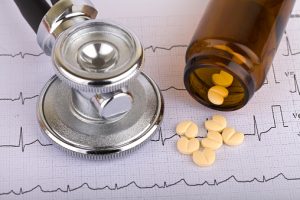 Researchers from Duke University have found that many patients with irregular heartbeats who suffer strokes are not on the necessary anticoagulant medications. Approximately 3 million Americans have atrial fibrillation—an arrhythmia or irregular heartbeat that causes the upper chambers of the heart to quiver chaotically and can raise the risk of blood clots forming in the heart. These clots can then travel to the brain and cause a stroke, meaning that anticoagulant medication is necessary for many with this condition as it can help prevent the formation of these clots, thus reducing their risk of stroke.
Researchers from Duke University have found that many patients with irregular heartbeats who suffer strokes are not on the necessary anticoagulant medications. Approximately 3 million Americans have atrial fibrillation—an arrhythmia or irregular heartbeat that causes the upper chambers of the heart to quiver chaotically and can raise the risk of blood clots forming in the heart. These clots can then travel to the brain and cause a stroke, meaning that anticoagulant medication is necessary for many with this condition as it can help prevent the formation of these clots, thus reducing their risk of stroke.
The study from Duke University found that 84 percent of stroke patients with atrial fibrillation were not receiving enough—if any—clot-preventing therapy. Dr. David Wilber, a cardiologist at Loyola University Medical Center and editor-in-chief of the journal JACC: Clinical Electrophysiology, commented on these results: “This emphasizes the fact that probably the most important cause of stroke in [atrial fibrillation] patients is under-anticoagulation or no anticoagulation.” Lead researcher of the study Dr. Ying Xian agreed, commenting, “We estimate that the vast majority of these strokes could have been prevented if patients had the appropriate anticoagulation.”
Advertisement
Despite these findings, as well as existing guidelines that recommend the use of anticoagulant agents in patients with atrial fibrillation, many still remain under-medicated. Dr. Xian suggests that this is due to the risks associated with many anticoagulant drugs, including internal bleeding in the gastrointestinal tract or brain. Also, some of the more common drugs are difficult to take as they may interact negatively with medications the patient is already on.
Patients who are at a high risk of falls or experiencing internal bleeding may not be able to take these medications and would require a different avenue of treatment, and while there are newer drugs that are more widely available, they are also more expensive than the existing options. Dr. Wilber posited that the physicians of these under-medicated participants may be over-estimating the risks associated with the use of anticoagulants while under-estimating their benefits.
This study highlights the need for better management of stroke risk in patients with atrial fibrillation—especially in cases where the individual is at a high risk for falls and internal bleeding—and is unable to take the more commonly prescribed anticoagulants. It also emphasizes the need for further research in order to develop safer and more accessible treatments for those with an irregular heartbeat so that their risk of stroke may be effectively reduced without potentially severe side effects.
